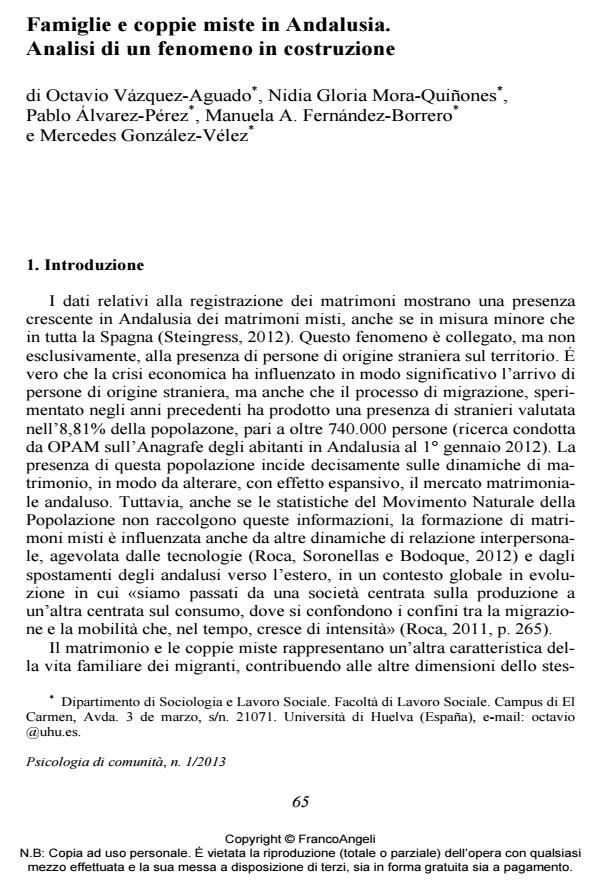Families and mixed couples in Andalusia. Analysis of a phenomenon under construction
Journal title PSICOLOGIA DI COMUNITA’
Author/s Octavio Vázquez-Aguado, Nidia Gloria Mora-Quinones, Pablo Álvarez-Pérez, Manuela A. Fernández-Borrero, Mercedes González-Vélez
Publishing Year 2013 Issue 2013/1
Language Italian Pages 10 P. 65-74 File size 660 KB
DOI 10.3280/PSC2013-001006
DOI is like a bar code for intellectual property: to have more infomation
click here
Below, you can see the article first page
If you want to buy this article in PDF format, you can do it, following the instructions to buy download credits

FrancoAngeli is member of Publishers International Linking Association, Inc (PILA), a not-for-profit association which run the CrossRef service enabling links to and from online scholarly content.
In this paper we analyze some of the characteristics of the phenomenon of marriages and mixed couples in Andalusia (Spain). Despite stressing the quantitative importance of this phenomenon, framed in a process of transformation of the family, our approach is essentially qualitative. To do this, based on the speech of people who are part of a mixed couple or family, we will discuss the factors that influence the choice of these couples, the perception of cultural differences in different areas related to national spouse’s extended family, the acceptance of cultural practices and especially, the education of children of these couples. In conclusion we can say that although the Andalusian and Spanish "marriage market" can not be understood without the presence of the foreign population, the most important thing might be that, from the point of view of social interaction and identity construction, this type of partnership is an obvious phenomenon of the society transformation, which exceeds thelimits of belonging or not to the group. However, despite the existence of a dominant culture, mixed couples become, not always successfully, in scenarios of negotiation and construction of interculturality. In this regard, children are an "area" in which to negotiate the identity and where the "bicultural desire" of parents clashes with the influence of other agents of socialization.
Keywords: Mixed Marriages; Intercultural Conflicts, Cultural Diversity, Family, Andalusia.
Octavio Vázquez-Aguado, Nidia Gloria Mora-Quinones, Pablo Álvarez-Pérez, Manuela A. Fernández-Borrero, Mercedes González-Vélez, Famiglie e coppie miste in Andalusia. Analisi di un fenomeno in costruzione in "PSICOLOGIA DI COMUNITA’" 1/2013, pp 65-74, DOI: 10.3280/PSC2013-001006